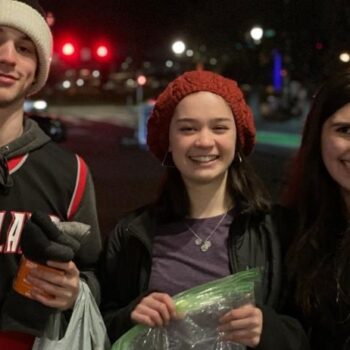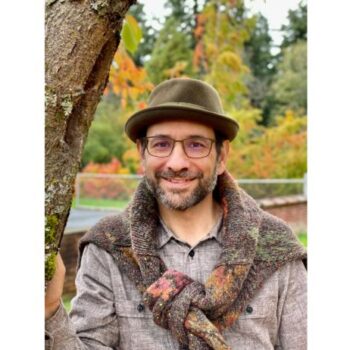The rectangular, slim-profile mailing boxes had been sitting in my office for a few months, clamoring for attention while I waited for the weather to turn cold. Within them rested seventy or so cozy hats that were hand-knit by Martha Decherd's sister-in-law. I had committed to distributing these to the heads of homeless Portlanders. With Mom’s death, the project was put on hold until this past Wednesday when my twelfth grade class and I drove down Naito.
An old congregant from Cleveland wrote me this past week, sharing a davar torah she had penned for last week’s Torah reading on the topic of the mi-khamokha line in our liturgy, which comes straight out of the Torah. She explored why the word mi-kamokha first appears without a dagesh, the little dot inside of certain Hebrew letters, while just three words later, it is written with a dot. This obscure grammatical question is one I asked Rabbi Stuart Kelman the year before I began rabbinical studies.
Most of us have invisible markers of identity that form and shape us, but which go unobserved by others and are often unremarked upon by us. One personal marker is the ringing in my ears, perpetual company since a bomb blast installed it there long ago. It’s one of the reasons I love music, for when I give it my full attention, this cacophony of crickets inside my brain quiets down, lulled into inaction by a greater sound of joy and feeling.
A couple of weeks back, I wrote about how grief places a mourner outside of the normal world. The concerns of grief are universal, timeless, but also highly individualistic. One consequence of this has been that I have not followed the news cycle as closely as normal. This morning, for example, I heard the terrible report of an attack on a Jerusalem synagogue. If you follow news from the Middle East, you have probably heard something about this already.
Rabbi Shmuly Yanklowitz had a social media post this week that touched me, for it spoke to where I find myself these days. He wrote: “A halacha of Shabbos muktzeh teaches us about human dignity. For observant Jews, we have objects that are muktzeh (can't be touched on Shabbos to preserve the sanctity of the day). One of those objects is a rock. Unless a rock was designated before Shabbos to have a unique purpose on Shabbos, you can't move it...”
This past week, I have been sitting shivah for my mother. It’s been a time filled with family, heightened emotion, and learning. One gleaning worth sharing is my recognition of what it means to hold shivah in a place where the deceased lived and was known versus shivah where the bereaved live. This is an important topic in a city like Portland where our CNS community is composed of multigenerational families as well as many transplants, such as my own family.
Earlier this week, a congregant shared with me a quote she had found particularly profound: “We are all given only two minutes to live; however, when we take a breath, then the clock resets.”





